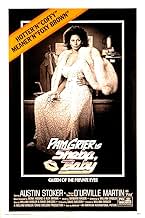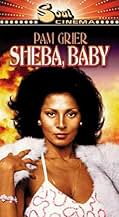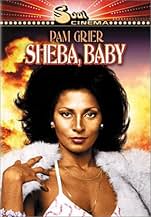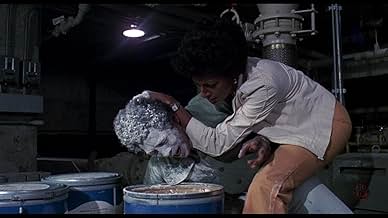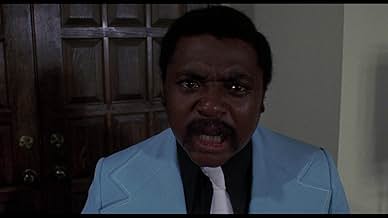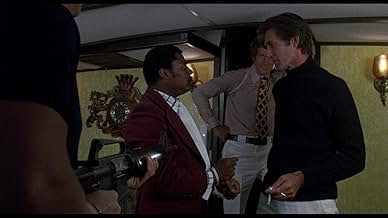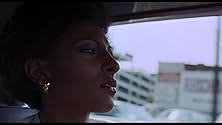AVALIAÇÃO DA IMDb
5,7/10
2,1 mil
SUA AVALIAÇÃO
Adicionar um enredo no seu idiomaA Chicago private detective returns back home to Louisville, Kentucky, to help her father fight mobsters.A Chicago private detective returns back home to Louisville, Kentucky, to help her father fight mobsters.A Chicago private detective returns back home to Louisville, Kentucky, to help her father fight mobsters.
- Direção
- Roteiristas
- Artistas
Richard Merrifield
- Shark
- (as Dick Merrifield)
Maurice Downs
- Killer
- (as Maurice Downes)
Edward Reece Jr.
- Racker
- (as Edward Reece)
Avaliações em destaque
No, this isn't Coffy, Foxy Brown, or even Friday Foster. It's Pam Grier toned down for the kiddies.
Unfortunately, with the loss of real action and Pam's boodilicious body, we also have to suffer through bad direction and a really lame script.
It is impossible to find a memorable quote from this film as there are none. The acting is wooden and, in most cases, just what you would expect from a flick that trades on the great roles Grier has had to date.
I was bored to tears.
Unfortunately, with the loss of real action and Pam's boodilicious body, we also have to suffer through bad direction and a really lame script.
It is impossible to find a memorable quote from this film as there are none. The acting is wooden and, in most cases, just what you would expect from a flick that trades on the great roles Grier has had to date.
I was bored to tears.
A Chicago private detective (Pam Grier) returns back home to Louisville, Kentucky, to help her father fight mobsters.
This film was the pet project of director William Girdler, who had already made "Three on a Meathook" (1972) but had yet to make his better known films, "Grizzly" (1976), "Day of the Animals" (1977) and "The Manitou" (1978). During filming, Girdler was only 28... and he would end up dying in a helicopter crash at age 30. (One assumes that had he lived, he would have been a major force in the 1980s.)
Writer David Sheldon was given the task of writing a script for Pam Grier that was less edgy than the movies Jack Hill had been making. He wrote "Honor" almost literally overnight, which was transformed into "Sheba, baby" by the PR department, and Sheldon was also put on as a producer. This was a huge promotion for Sheldon, who had been at AIP as Larry Gordon's assistant (and later "director of development", which essentially means script reader).
For me, the blaxploitation subgenre is an interesting one -- did people dress like this? Now, I did not live through the 1970s nor did I grow up in a big city. But I feel like the "pimp" clothes and similar styles were more likely created in the movies and adopted in real life than the other way around. What is especially interesting is that most of the people involved in the subgenre were white... so this was very much how the black community was perceived rather than how it actually was.
One exception to this in "Sheba" might be the character of "Killer", played by Maurice Downs. Downs was a gangster and heroin dealer in real life, and somehow got mixed up with Sheldon and Girdler. He was also in their follow-up, "Project: Kill" and helped produce it. Tragically (but not surprisingly), he was shot to death outside a restaurant a few years later in true gangster fashion.
"Sheba, Baby" was a major hit in theaters, even though it is often cited as one of Pam Grier's weaker vehicles when compared to her similarly themed action films "Coffy" and "Foxy Brown" (both made by Jack Hill for AIP). This is fair, and it certainly lacks any iconic moments that really burn into a viewer's mind.
Despite this being a second or third tier film, it remains an important part of Grier's career, as well as Girdler's career, and there seems to always be a new generation of fans searching out every last AIP picture. Arrow Video has wisely picked this one up and given it the star treatment.
The Arrow disc has not one, but two audio commentaries. One with writer-producer David Sheldon, which offers incredible insight on AIP, Pam Grier and even legendary director Jack Hill. Heck, some of his detours are more interesting than his recollections of "Sheba", such as how he clarifies that "Grizzly" was not technically a "Jaws" ripoff because "Jaws" had not been released at that point. Heck, even Sheldon's involvement in "Last House on the Left" is discussed!!
We also have an in-depth retrospective on Pam Grier's time at AIP. Did you know that Grier was working as a switchboard operator before being discovered by Roger Corman and Jack Hill? Amazing!
This is an absolutely MUST-OWN disc for any fan of AIP.
This film was the pet project of director William Girdler, who had already made "Three on a Meathook" (1972) but had yet to make his better known films, "Grizzly" (1976), "Day of the Animals" (1977) and "The Manitou" (1978). During filming, Girdler was only 28... and he would end up dying in a helicopter crash at age 30. (One assumes that had he lived, he would have been a major force in the 1980s.)
Writer David Sheldon was given the task of writing a script for Pam Grier that was less edgy than the movies Jack Hill had been making. He wrote "Honor" almost literally overnight, which was transformed into "Sheba, baby" by the PR department, and Sheldon was also put on as a producer. This was a huge promotion for Sheldon, who had been at AIP as Larry Gordon's assistant (and later "director of development", which essentially means script reader).
For me, the blaxploitation subgenre is an interesting one -- did people dress like this? Now, I did not live through the 1970s nor did I grow up in a big city. But I feel like the "pimp" clothes and similar styles were more likely created in the movies and adopted in real life than the other way around. What is especially interesting is that most of the people involved in the subgenre were white... so this was very much how the black community was perceived rather than how it actually was.
One exception to this in "Sheba" might be the character of "Killer", played by Maurice Downs. Downs was a gangster and heroin dealer in real life, and somehow got mixed up with Sheldon and Girdler. He was also in their follow-up, "Project: Kill" and helped produce it. Tragically (but not surprisingly), he was shot to death outside a restaurant a few years later in true gangster fashion.
"Sheba, Baby" was a major hit in theaters, even though it is often cited as one of Pam Grier's weaker vehicles when compared to her similarly themed action films "Coffy" and "Foxy Brown" (both made by Jack Hill for AIP). This is fair, and it certainly lacks any iconic moments that really burn into a viewer's mind.
Despite this being a second or third tier film, it remains an important part of Grier's career, as well as Girdler's career, and there seems to always be a new generation of fans searching out every last AIP picture. Arrow Video has wisely picked this one up and given it the star treatment.
The Arrow disc has not one, but two audio commentaries. One with writer-producer David Sheldon, which offers incredible insight on AIP, Pam Grier and even legendary director Jack Hill. Heck, some of his detours are more interesting than his recollections of "Sheba", such as how he clarifies that "Grizzly" was not technically a "Jaws" ripoff because "Jaws" had not been released at that point. Heck, even Sheldon's involvement in "Last House on the Left" is discussed!!
We also have an in-depth retrospective on Pam Grier's time at AIP. Did you know that Grier was working as a switchboard operator before being discovered by Roger Corman and Jack Hill? Amazing!
This is an absolutely MUST-OWN disc for any fan of AIP.
Pam Grier is as lean, cool and tough as ever in this film (in fact, she's arguably tougher here than in "Foxy Brown"), but the plot is overly familiar ("Return of the Dragon", anyone?) and the flick is poorly edited in just about all the crucial spots (fight and action sequences). This one is mostly for Grier fans, who'll have an OK time. The "PG" rating is questionable, considering a few quite graphic and bloody scenes. (**)
This lesser film from Pam Griers' days as a blaxploitation queen is nonetheless mildly pleasing. Because it's rated PG, it has less punch than Pams' best stuff. Some viewers will really miss the elements of sex and graphic violence. The script, by producer David Sheldon and cult director William Girdler, is somewhat less than inspired, with only one sequence - the pursuit through the carnival - that could be considered memorable. The cast is also more colourless than usual. But Pam, in her inimitable fashion, could make just about anything watchable. Hell, this is worth watching just to see her in a wetsuit.
Pam plays our title character, Sheba Shayne, a Chicago-based private eye who returns to her hometown of Louisville, Kentucky. It seems that aggressive gangsters are constantly threatening her father Andy (Rudy Challenger) and his loan business, which Andy runs with Shebas' good friend Brick (Austin Stoker). Inevitably, the bad guys will have a full scale war on their hands once Sheba steps into the fray.
The ever engaging Stoker of "Assault on Precinct 13" fame is a good leading man for Pam, and D'Urville Martin is lively as "Pilot", a lowlife criminal. Christopher Joy is a hoot as a peddler who for whatever reason dresses more like a stereotypical pimp. Dick Merrifield is amusing enough as smiling, smarmy white guy villain "Shark". And it's nice to see Girdler regular Charles Kissinger as a mostly ineffectual white detective. Pam is great entertainment and eye candy as always, even if her role here isn't really on a level with her most famous ones.
The action scenes are passable (one comeuppance offers a spin on something we'd previously seen in "Coffy"), and the music score by Alex Brown and Monk Higgins (with vocals by Barbara Mason) is good, even if, like so much else here, it's also unmemorable.
Completists of the filmographies of Pam and Girdler will definitely want to check it out, no matter if it's not their best work.
Six out of 10.
Pam plays our title character, Sheba Shayne, a Chicago-based private eye who returns to her hometown of Louisville, Kentucky. It seems that aggressive gangsters are constantly threatening her father Andy (Rudy Challenger) and his loan business, which Andy runs with Shebas' good friend Brick (Austin Stoker). Inevitably, the bad guys will have a full scale war on their hands once Sheba steps into the fray.
The ever engaging Stoker of "Assault on Precinct 13" fame is a good leading man for Pam, and D'Urville Martin is lively as "Pilot", a lowlife criminal. Christopher Joy is a hoot as a peddler who for whatever reason dresses more like a stereotypical pimp. Dick Merrifield is amusing enough as smiling, smarmy white guy villain "Shark". And it's nice to see Girdler regular Charles Kissinger as a mostly ineffectual white detective. Pam is great entertainment and eye candy as always, even if her role here isn't really on a level with her most famous ones.
The action scenes are passable (one comeuppance offers a spin on something we'd previously seen in "Coffy"), and the music score by Alex Brown and Monk Higgins (with vocals by Barbara Mason) is good, even if, like so much else here, it's also unmemorable.
Completists of the filmographies of Pam and Girdler will definitely want to check it out, no matter if it's not their best work.
Six out of 10.
Lesser Pam Grier blaxploitation movie has Pam as Sheba, a tough private investigator who returns to her hometown of Louisville, KY to fight mobsters who are pushing her father around. While there she finds time to romance Austin 'Assault on Precinct 13' Stoker. Less gritty and sexy than Grier's blaxploitation classics Foxy Brown and Coffy. The acting is wooden, the direction amateurish, the action slow, and the dialogue lacks punch. None of this is uncommon with blaxploitation films, but this one is lacking the sex, violence, and colorful language that usually spackles over the cracks in these things. The film being shot on location in Louisville does add some authenticity and local flavor, which helps. The movie is propped up mostly just by Grier's screen presence. So completists will want to see it for sure. Those expecting something with a little more spice to it are likely to be disappointed.
Você sabia?
- CuriosidadesThis was Pam Grier's final film under contract with American International Pictures.
- Erros de gravaçãoDuring the final boat chase, Shark is shown firing at least ten shots from a six-shot revolver (a Smith & Wesson Model 36).
- Citações
Sheba Shayne: You better talk, big man, before I put my number one foot down your number one mouth.
Walker: Shit, you can't kick no shadow, bitch! Catch me!
[runs away]
- Versões alternativasThere is a 16 mm version with English dialogue and English subtitles, including character names in brackets when actors speak off-camera and indication of ambient sounds.
- ConexõesFeatured in Black in the 80s: Color in Film (2005)
- Trilhas sonorasSheba, Baby
Music by Roderick Rancifer
Words by Cloteal Cleveland
Sung by Barbara Mason
Courtesy of Buddah Records
Principais escolhas
Faça login para avaliar e ver a lista de recomendações personalizadas
- How long is 'Sheba, Baby'?Fornecido pela Alexa
Detalhes
- Data de lançamento
- País de origem
- Idioma
- Também conhecido como
- Sheba Shayne
- Locações de filme
- Empresas de produção
- Consulte mais créditos da empresa na IMDbPro
- Tempo de duração1 hora 30 minutos
- Cor
- Proporção
- 1.85 : 1
Contribua para esta página
Sugerir uma alteração ou adicionar conteúdo ausente

Principal brecha
By what name was Sheba, Baby (1975) officially released in India in English?
Responda

